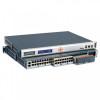Lantronix SLC 8000 Advanced Console Manager User Guide - Page 125
Number of Operations, Number of Packets
 |
View all Lantronix SLC 8000 Advanced Console Manager manuals
Add to My Manuals
Save this manual to your list of manuals |
Page 125 highlights
6: Basic Parameters 3. Modify the probe settings: Probe Type Select from one of the available probe types: DNS Lookup - Performs a DNS lookup on the hostname specified in the Destination Host using the Name Server. By default port 53 is always used as the Destination Port. HTTP Get - Performs an HTTP Get to the home (root) of the web server at the Destination Host and Destination Port. ICMP Echo - Sends ICMP Echo (ping) packets to the Destination Host. TCP Connect - Performs a TCP Connection to the Destination Host and Destination Port. UDP Echo - Sends UDP Echo packets to the Destination Host and Destination Port. UDP Jitter - Sends UDP jitter packets using a simplified version of the Cisco IP SLA v2 (Engine II) protocol to the Destination Host and Destination Port. UDP Jitter VoIP - Sends UDP jitter packets configured to simulate Voice over IP network traffic (VoIP) using a simplified version of the Cisco IP SLA v2 (Engine II) protocol to the Destination Host and Destination Port. Name Probe name, up to 40 characters long. Valid characters are letters, numbers, dashes (-), periods and underscores (_). Number of Operations Number of operations to perform for the probe. Probes can for a specific number of operations. The valid range is 1 - 1000, and the default is 100. Frequency between Operations Time between probe operations, in seconds. The valid range is 5 - 3600 seconds, and the default is 60 seconds. Number of Packets Number of packets to send for each probe. For DNS Lookup probes, this is the number of lookups to perform. For HTTP Get probes, this is the number of HTTP Gets to perform. For TCP Connect probes, this is the number of TCP connections to perform. The valid range is 1 - 1000 for the Local repository and 1 - 2000 for a USB or SD card repository. The default is 10 packets. Interval between Packets Interval between packets in milliseconds. The valid range is 10 - 5000 milliseconds, and the default is 500 milliseconds. For HTTP Get, DNS Lookup and TCP Connect probes, the timeout must be less than the interval due to a new socket being created and destroyed for each packet. Start Time Time to start the probe: Now starts the probe immediately; At date/time will start the probe at the specified date and time in the future; After waiting will start the probe after waiting a period of time that is less than 24 hours. When the SLC is rebooted, the probe will start according to the Start Time settings: (a) immediately if it set to Now, (b) at a date and time in the future if it is set to At date/time and the date and time is in the future, (c) after waiting a period of time if it is set to After waiting. Destination Host The hostname or IP address to send packets to. For DNS Lookup probes this is the hostname to lookup. Destination Port The TCP or UDP port to send packets to. For ICMP probes, the port setting is not used. For DNS Lookup probes, the destination port is always port 53. Port 1967 is reserved for the UDP jitter responder. The valid range is 1 - 65535. Precision The precision to view results in - milliseconds (the default) or microseconds. Jitter results are always displayed in milliseconds. SLC™ 8000 Advanced Console Manager User Guide 125















